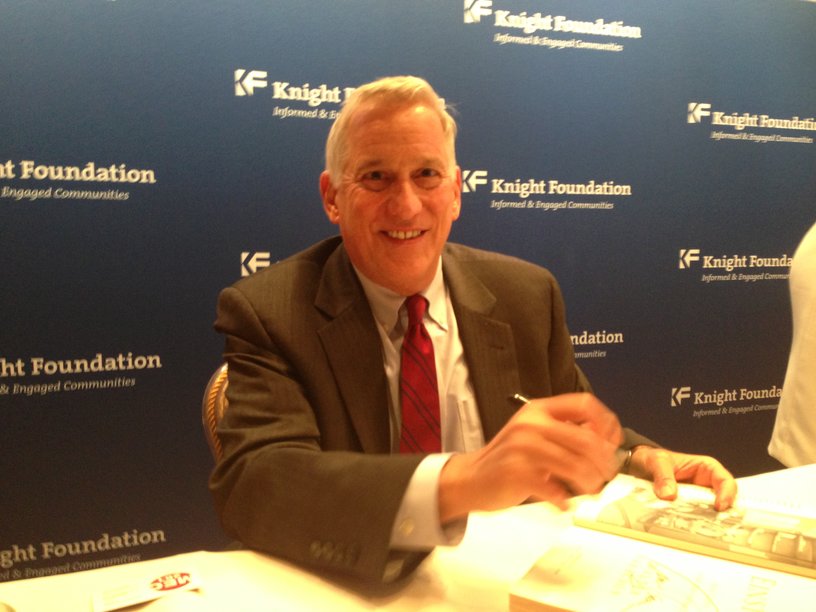
Biographer Walter Isaacson on lessons from great entrepreneurs
Above: Walter Isaacson.
As one of the most preeminent biographers of our time, Walter Isaacson has shared the stories of the world’s greatest innovators: Steve Jobs, Albert Einstein and Benjamin Franklin. Yesterday, as part of a Knight Foundation organized luncheon, Isaacson, President and CEO of the Aspen Institute, spoke to Miami city leaders about how lessons from the greatest entrepreneurs of the past may help advance the city’s role as a leader in creativity and entrepreneurship.
Isaacson said that while Silicon Valley has had the advantage of great engineering in innovation for the last 20 to 30 years, cities like Boston, New Orleans and Miami are now gaining greater national attention as hubs for innovation.
“While Silicon Valley is a great place for engineering, it is not the place where all the creativity happens,” he said. “Cities like Miami have such a competitive advantage because of their understanding of entrepreneurship but also of art and beauty and design and how to connect that to everything that we do.”
Leaders in innovation, according to Isaacson, have similar traits and values that cities like Miami can adapt into their idea culture. He said that great innovators of the past recognize that there is a connection between beauty, ease and simplicity. All of them also know that diversity– different people and communities– are a source of creativity and strength. And it is ultimately being able to find common ground that allows us to thrive and prosper.
“The common thing of all of these [biographies] was a sense that the real rules don’t apply,” Isaacson said. “Some cultures are better at inculcating that.”
Beauty, design and simplicity
Isaacson says that great innovators like Steve Jobs have programmed themselves to seek out ‘what’s working’ and ‘what’s not’ in all aspects of what they do. It’s this mentality that led Jobs to take a risk and challenge the global tech economy to value simplicity and human-centered design.
He said that it’s important that city leaders take on that role when seeking to make more of a place where ideas are spread:
“I realize that [Jobs] is the only person who has been able to transform 7 industries including TV, radio, publishing and retail,” Isaacson said. “Why? Because he was able to say let me be passionate about making things simple and beautiful and easy.”
He explained that Jobs believed: it is important that entrepreneurs and leaders hold themselves responsible for the depth of beauty in any service or product. “You have to care even about the parts unseen,” he said, referencing Jobs’ mantra.
Finding common ground solutions
According to Isaacson, Franklin believed that the success of the nation, was based on its ability to find “common ground” solutions to problems. Isaacson equated this with community leaders’ desire to seek solutions within Miami and create spaces for collective connectivity that will help to advance its idea economy.
He said that finding solutions often begins with conversations. Events and meetings like those sponsored by the Knight Foundation today, use a connectivity method that’s similar to the great innovators of the past. Franklin believed that the success of the nation was rooted in similar ideals:
“[Franklin’s] great leap of the imagination is that the strength of the nation would come from fact that we the ‘middle people’ would be able to find common ground,” Isaacson said, “which is obviously what foundations like Knight are doing here.”
Diversity
Isaacson said that every biography he has written features an innovator who is first generation in some way. He said that Miami, because of its many immigrants and diverse culture, can plays an influential role in the sphere of innovation precisely because of its diversity.
“What you have with people who make a choice to come somewhere is the fact that they are already entrepreneurs,” Isaacson said. “They are already driven to get a better life and become a part of something new.”
He went on to challenge Miami to uphold similar values and beliefs, and leverage its diversity to maximize its potential.
“The very essence of America,” Isaacson said, “is that people came from all over to create something new. That is what innovation means. That is what entrepreneurship means, and that is what America means.”
By Jenna Buehler, executive assistant/communications at Knight Foundation
Recent Content
-
Community Impactarticle ·
-
Community Impactarticle ·
-
Community Impactarticle ·


